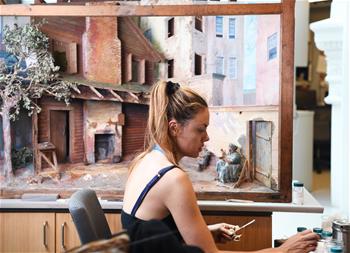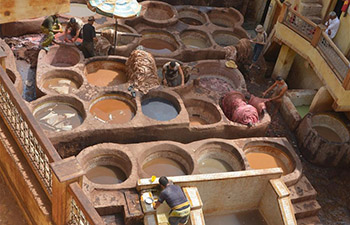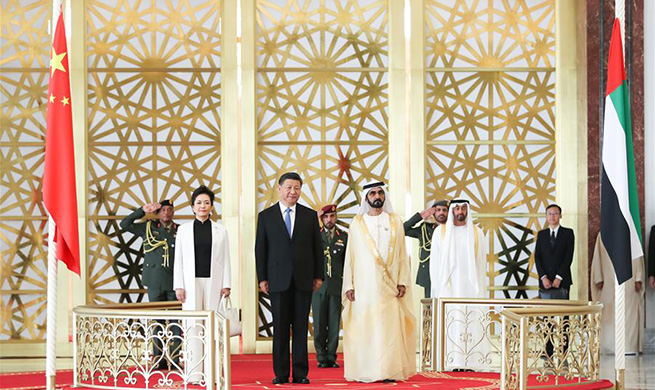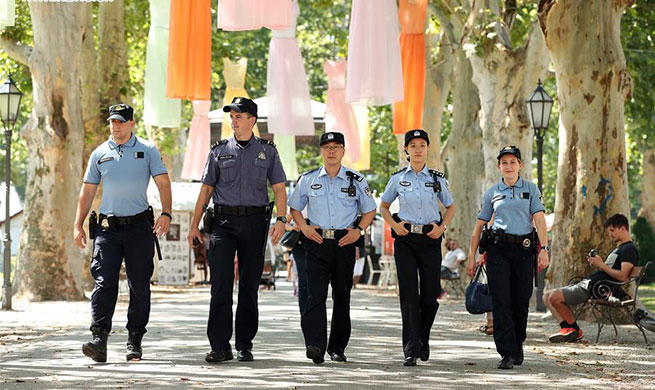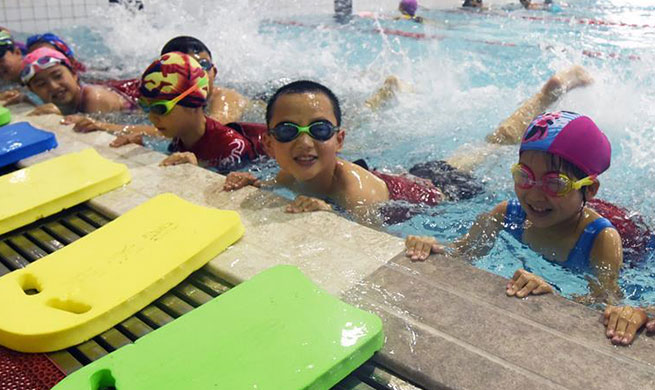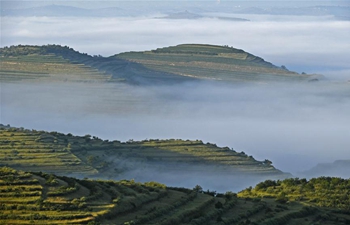By Relja Dusek
ZAGREB, July 19 (Xinhua) -- It is a hot and sunny day in Zadar, Croatia. Luckily, the old city lies on the Adriatic Sea, with beautiful beaches and crystal-clear water. Tens of thousands of tourists visit the seaside. They lie on the city's beaches, sunbathing and enjoying the sun.
At the same time, around a hundred boys are squeezing onto the green field of Zadar's football club in the midday sun. They don't mind the heat because they are here to greet their heroes, and they are ready to wait for hours if necessary. The children are all training here at the club that has produced some of the best players in the world.
One of them is Luka Modric, captain of the Croatian national team, who just a few days ago, played in the World Cup final. Croatia lost the game, but Modric won the Golden Ball awarded to the World Cup's best player. Now, he has returned to his hometown Zadar and the children who play football here have a chance to meet him.
"Luka Modric is the best. I can't believe I will meet him in person. I will ask him to sign me this ball," a 10-year-old boy eagerly told Xinhua.
Luka Modric was not the only player there on Wednesday. Goalkeeper Danijel Subasic, Sime Vrsaljko, and Dominik Livakovic, along with Luka Modric are all, as they say here, "Zadar's children". They started playing football in Zadar and ended up at Real Madrid, Monaco and Atletico Madrid.
For a city with just 170,000 citizens, this is remarkable. As remarkable as the fact that Croatia, a country of around 4.1 million people, has reached the World Cup final. It is the smallest country to do so since Uruguay in 1950.
Is there a secret behind Croatia's success? Is there a new, never seen "Croatian system" that has managed to produce players like Luka Modric or Mario Mandzukic? Unfortunately, the answer is "no".
"I wouldn't say there is a system behind it. There are some explanations for this success but the system is not one of them," Mihovil Topic, a Croatian sportswriter told Xinhua. "I believe that genetics play an important role. People in this country are genetically strong and very talented for football," Topic explains. He noted that it is hard to climb the ladder of success in Croatia and sport is one of the shortcuts.
"Hungry people run faster. We are ready to sacrifice more than people in other western countries, while at the same time we have a strong football tradition and enough influence of modern football," Topic said.
Danilo Paunovic coaches youngsters at Zadar. He grew up with Modric and his best friend Subasic. They all trained together in Zadar during the war in Croatia and continued afterward. "We just love this game. We used to play football every day, all day long. When they were bombing our city in the war, we would hide in basements just for a while and immediately go back to the field once we heard the sirens symbolizing the immediate danger is gone," Paunovic told Xinhua.
"This environment is full of talented children but we need a better system, a better infrastructure and then one day we will have even more players like Luka Modric," Paunovic said.
Svetko Custic is a director at Zadar. He is very proud of the national team's success and hopes that this success is a great opportunity for the country to invest more in football, especially in smaller cities.
"The atmosphere in clubs is not the same as in the national team. Unfortunately, life in the Croatian football clubs is not easy. We need more investments in the infrastructure and better conditions to work in smaller clubs," Custic told Xinhua.
More than half the country doesn't have training facilities during the winter. "In 12 out of Croatia's 20 counties there is no football pitch with an artificial turf. The infrastructure is terrible. You have to see some of those locker rooms, even in the capital Zagreb, in the clubs that produced great players," Topic said.
Croatia is a very centralized country. Living standards in the capital are much better than elsewhere and everything is gravitating to the capital Zagreb. So is football. The biggest club in the country is Dinamo Zagreb.
Half of the players from the national team have roots in this club. Even Luka Modric and Sime Vrsaljko, players who grew up in Zadar, later moved to Dinamo Zagreb, a club that became a showcase of sorts for Croatian players. In Dinamo Zagreb, they believe that there is a solid system in Croatian clubs and this, together with the National Football Federation (HNS), played an important role in Croatian football success.
They also mention the role of individual players' talent and their strong desire to prove themselves and succeed. "Dinamo's football school was named one of the top five football schools in the world. We have produced 67 players who play professional football around Europe and by that standard, we take the second place in Europe," Andjelko Ivanko, an assistant director of Dinamo Zagreb's football school told Xinhua.
"We have 600 boys and girls who train football in our club. They start training when they are seven and compete when they are eight years old. They train four to seven times per week, depending on their age," Ivanko explained. Football is not an expensive sport in Croatia.
The monthly training fee for one child, in most Croatian clubs, is around 200 kuna (30 U.S. dollars). In Dinamo Zagreb, Ivanko said, children don't have to pay the fee; the club provides equipment and pays for travel costs and accommodations to tournaments.
"The HNS system has been improved in the last ten years and development of young players has become a prime goal in their activities. Since the economic situation in Croatian football is not great, clubs were forced to focus on the players from their own football schools. More and more young players have a chance to play in the first or the second division and through that earn a much-needed experience of playing senior football," Ivanko explained.
While Dinamo Zagreb is turning a profit from the talent pool around Croatia, smaller clubs struggle to keep their young players. The most talented players leave their clubs when they are 15 or 16. "I don't think it is good for Croatian football. The football federation should create a system in which local children will stay in local clubs as long as possible with equal conditions. This would be good not only for smaller clubs but ultimately for the national team too," Custic told Xinhua. Without a system, Croatian football will rely only on the player's talent and enthusiasm of individual coaches.
"There are some really great people, individuals who are crazy about football and who fanatically work with children. They sacrifice their time for these children, usually for no money in return," Topic explained. "The World Cup final is an unbelievable success but some things have to change in Croatian football."





